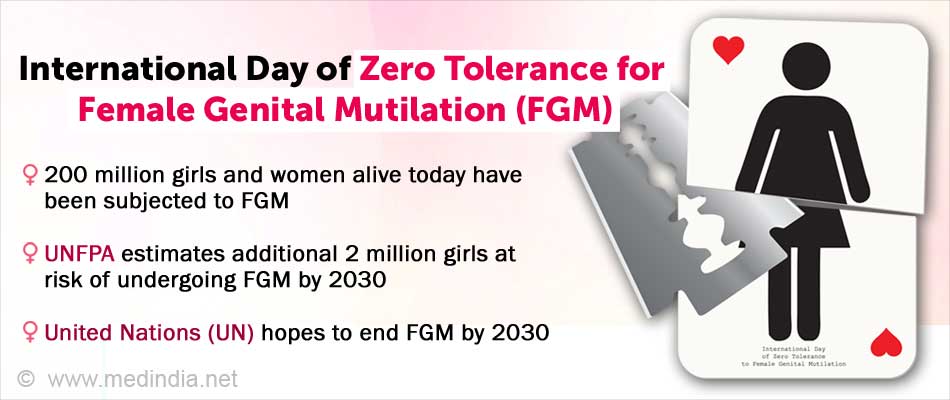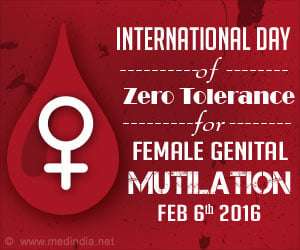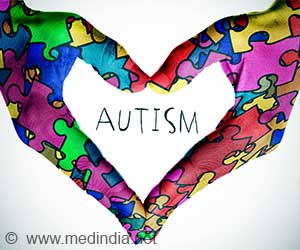International Day of Zero Tolerance for Female Genital Mutilation (FGM) raises awareness and encourages action to address FGM, emphasizing the exacerbating effect of COVID-19 on FGM.

- Female Genital Mutilation (FGM) is internationally recognized as a violation of girls' and women's human rights, health, and integrity
- COVID-19 pandemic is worsening existing gender and social inequalities
- 2021 Theme: No Time for Global Inaction, Unite, Fund, and Act to End Female Genital Mutilation
- People can participate on social media using the hashtag #Act2EndFGM!
The UNFPA-UNICEF Joint Programme on the Elimination of Female Genital Mutilation and the Inter-African Committee on Traditional Practices (IAC) have jointly launched the 2021 theme: "No Time for Global Inaction, Unite, Fund, and Act to End Female Genital Mutilation."
People can participate on social media using the hashtag #Act2EndFGM!
Short term complications of the act include shock, excessive bleeding, infections, severe pain, STDs, and difficulty in urination, whereas the long term consequences include complications during childbirth, infertility, menstrual abnormalities, and genital cyst formations, all of which affect their sexual and reproductive health and mental health.
TOP INSIGHT
COVID-19 has resulted in a negative slope in the movement's growth, leading to the disruption of Sustainable Development Goals target 5.3 of the UN on the elimination of all harmful practices including, female genital mutilation.
Read More..
What Promotes this Practice?
Gender inequalities and power imbalances between men and women sustained by limited opportunities for girls and women to realize their rights and full potential pave the way for this brutal practice.FGM is an extreme form of discrimination against women, reflecting deep-rooted gender inequality.
Evidence shows that the COVID-19 pandemic is further worsening existing gender and social inequalities.
Actions Taken Towards FGM
UNFPA and UNICEF lead the most extensive global program to promote the elimination of female genital mutilation since 2008. This program focuses on 17 countries in Africa and the Middle East, at the same time supporting regional and global initiatives.More than 2.8 million people have participated in public declarations of FGM elimination. The number of communities establishing surveillance structures to track girls doubled and protected 213,774 girls from facing this practice.
However, the COVID-19 pandemic of 2020 has resulted in a negative slope in this movement's growth. It has led to the disruption of Sustainable Development Goals target 5.3 of the UN to eliminate all harmful practices, including female genital mutilation.
“Together we can eliminate female genital mutilation by 2030. Doing so will have a positive ripple effect on the health, education and economic advancement of girls and women,” said UN Secretary General António Guterres
While previously, the UN hoped to end FGP by 2030, the UNFPA states that additional 2 million girls have been projected to be at risk of undergoing female genital mutilation by 2030. In response, the UN has adapted interventions to ensure that FGM is integrated with the humanitarian and post-crisis response.
Healthcare providers have also acted as powerful agents for service and change in their communities by offering preventive services at the primary care level and ensuring the highest quality care possible for women and girls who have undergone FGM.
WHO and HRP Research are working with national research institutions in Guinea, Kenya, and Somalia to study the effectiveness of health systems for FGM prevention and care package, including interactive training for nurses and midwives to build skills for providing person-centered communication on FGM prevention.
What Steps Need to be Taken Now?
According to the WHO FGM Cost calculator, the economic cost of FGM amounts to USD 1.4 billion annually. This puts a significant financial burden on health systems and national budgets, especially in countries with FGM rates greater than 10%. Eliminating this harmful practice is crucial to global efforts to build back stronger.Steps need to be taken at many levels, from dialogue and action to engage families and communities, to protection and care services for girls and women, laws and enforcement, and political commitment at the local, regional, national, and international levels to eradicate FGM.
To promote the elimination of female genital mutilation, coordinated and systematic efforts are needed. They must engage whole communities and focus on human rights, gender equality, sexual education, and attention to the needs of women and girls who suffer from its consequences.
References :
- International Day of Zero Tolerance for Female Genital Mutilation - (https://en.unesco.org/)
- The International Day of Zero Tolerance for Female Genital Mutilation (FGM) - (https://www.who.int/)
- International Day of Zero Tolerance for Female Genital Mutilation | United Nations Female Mutilation Day Message - (https://www.un.org/en/observances/female-genital-mutilation-day)
Source-Medindia
 MEDINDIA
MEDINDIA




 Email
Email




